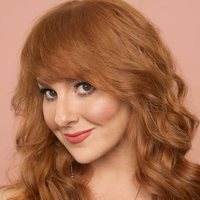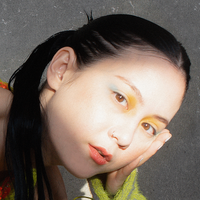On knowing when to share your work
Prelude
Beth Morgan is the author of A Touch of Jen. Her work has been published in The Iowa Review and The Kenyon Review Online. You can follow her on Instagram at @gentle_herbal_laxative.
Conversation
On knowing when to share your work
Writer Beth Morgan on avoiding boredom, figuring out what feels authentic, and disrupting your usual patterns.
As told to Shy Watson, 1724 words.
Tags: Writing, Process, Mental health, Collaboration.
I find it so difficult to imagine a world or events that operate under laws unlike those of our known universe. How did you cultivate the ability to do such a thing, or does it come naturally?
Honestly, it’s something that I do all the time, and I think that’s partly because I’m such an anxious person. I’m constantly imagining terrible things that could happen, even if they defy the laws of our known reality. I think it interacts with my OCD, which has been much worse over the pandemic.
Same.
Every night, I would be looking at my oven to make sure it was off, and as I was staring at the knobs, I would be doubting my ability to perceive that they were really off. I felt like anything could change at any time. My experience of reality is often like that. It’s a short jump from not trusting that my oven is off to not knowing if there’s a monster in my shower head.
That actually does make sense to me, and I wasn’t expecting you to say that it was OCD, but I have the same thing where I’m constantly doubting everything to the point where I can be looking at tangible evidence of having done something and I’m like, “But did I?”
Totally.
What element from the realistic beginning of A Touch of Jen made it possible for such a fantastical end? At what point did we slip into the possibility of the otherwise impossible?
On a brass tacks level there’s a moment in the Hamptons where Remy sees something in the bushes and he doesn’t really know what it is. It’s the first hint of something beyond social comedy, or beyond the stakes of the world as we’ve known it before. There’s also Alicia’s sleepwalking before this, which is unsettling but totally explicable in realistic terms. I thought a lot about about how much to plant at what time, and ultimately I didn’t want the supernatural stuff to feel overly integrated into the universe of the first part of the book. I wanted to give little hints of the supernatural to prime the readers a bit and then suddenly immerse them in this scary new reality.
What do you do when you’re creatively stuck?
Well, with this book, I took mushrooms. I was struggling with some logistical issues towards the end and needed to think about the plot in a new way. It wasn’t necessarily about the mushrooms per se, as much as it was about trying to disrupt my old patterns of thinking. I think that being in an MFA program was also helpful in this way. I was reading so many other people’s writing and thinking about it on a craft level, that I wasn’t getting stuck in my own ruts so much, because I was thinking about how to solve other people’s problems. So I think that everything that I do to keep myself creatively activated, or to prevent myself from getting in ruts, is just trying to disrupt my patterns.
Yeah. New age philosophies of magical thinking are big themes in A Touch of Jen. Is this something you partake in or are you wary of it?
As someone who’s had bad experiences with OCD at different times in my life, I definitely engage in magical thinking all the time. I also come from a religious background. My father’s a pastor, so I’ve been around a lot of magical thinking around prayer, which you can think about in terms of the universe looking back at you.
I don’t necessarily engage in the type of new age mysticism that’s in A Touch of Jen, though I definitely see its allure. If anything, I was trying to explore some of the narcissism of new age thinking—the way it’s so often focused on individual self-actualization, which is seen as the ultimate good, rather than ideals or goals that are more collective.
Do you think that following a sense of personal destiny ultimately leads to some kind of destruction?
There are degrees of everything obviously, and I don’t think there’s anything inherently wrong with trying to find a sense of purpose and stability, which is what so many of the characters in the book are longing for. But I do think that when you’re following a sense of personal destiny, there’s this danger that you might start to see anyone who gets in the way of that as a means to an end or a monster to be vanquished.
Good point. You thanked MetaFilter in your acknowledgements. I was wondering what MetaFilter is and how it helped you write your book?
It’s like Quora, but it’s older and it’s higher quality because in order to participate in the forums and ask questions and answer questions, you have to pay a one-time fee of $5. So just that tiny fee, even though it’s not recurring, really changes the quality of the conversation. People are so excited to be helpful. There’s so many people out there with really specific knowledge. And I only asked a few questions on MetaFilter, but you could just get lost on there forever because people love to weigh in.
What questions did you ask?
I asked a question about the kinds of chaotic experiences people have working in hospitals. Hospitals are such a trope in books and TV and I didn’t want the hospital scene in the book to feel cliché.
You did a really good job with that scene by the way, I was like, “This is hell on earth.” It was just like a maze from hell. It seemed very real to life, unfortunately.
Oh good, I’m glad.
So what does your curiosity look like when you’re moving through a creative project? Like how do you explore different things?
I’m just doing everything I can to not be bored. If I can feel that I’m dreading writing a section, I’ll sometimes ask myself if it’s something that’s really necessary to the story. If I’m not feeling a ton of interest, is there maybe something that would be better?
How does the lens of social media confirm or distort our preconceptions of other people?
It mostly has to do with the perception of intimacy that we have, even with people who might just be acquaintances. I think that there’s a real sense, illusory or not, that you know people who you maybe see maybe once a year. There are people who I’ve met maybe five times in my life who I know what their job is, what they’re doing, what they had to eat today. And I feel like they are my friends, because so often we’ll just, like, message, but we haven’t seen each other in real life in years sometimes, even if we live in the same neighborhood. So, I think that social media can just alter your sense of access to people, especially because sometimes people use social media to be more vulnerable than they might be in a real life conversation. Or they might talk about their needs more, ask for things on social media that they might not elsewhere. So I do think that there’s a specific type of intimacy that has changed the way that we interact that is specifically a product of social media.
How did you manage to make your characters so unlikable yet simultaneously instill so much empathy within your readers?
I’m glad that you felt empathy for them, because that’s what I’m always hoping for. Whenever I’m writing a character, I’m trying to think about what’s going to interest me as a reader and as a writer, and what’s going to interest me is something that feels really real, which is often a moment that shows their vulnerability. Accessing characters’ vulnerability in this way can sometimes make them unlikable and it can sometimes make them really, really sympathetic.
You did a good job balancing the two.
I’m never really writing in a spirit of contempt. I mean, not never, occasionally maybe, but most of the time, I’m just trying to figure out what feels authentic and what is going to jog a sense of recognition in someone else.
How do other people or collaborators figure into your work?
My partner is a big part of my process. He’s my first reader. He’s someone who I talk to a lot and I think it’s a constant struggle between figuring out when to share and when to keep it private. At what point do I need to talk through something with another person? And when do I still just need to let it sit inside me and work on it in a very interior way? But for the most part, I try not to give him anything until it’s as far as I can get on my own. Even if I am talking about it sometimes in an abstract way beforehand. And when I do share it, it’s very involved because we talk about it a lot.
With A Touch of Jen, for example, we read it out loud, the whole thing, twice, over the whole course of the editing process. You can always read your own work out loud, but you’re only going to pick up on the things that you specifically are going to pick up on. Whereas another person is going to pick up on things that are totally invisible to you, because you’re just so used to looking at it that you can’t see straight anymore.
Why is it that you wait until something is as worked out in your mind as it can be before sharing it?
I’ll think about things a lot before I even start writing them. There are novels that I’ve been thinking about for years, that I still haven’t started writing in earnest, even if I’ve taken a lot of notes on them. But when I sit down to write something, I mostly have a rough picture of the whole thing in my mind. That doesn’t mean there aren’t moments of discovery along the way. But I have that as my guide and it’s only when it’s on paper that I have to get outside help to figure out if I’ve faithfully actualized my vision.
- Name
- Beth Morgan
- Vocation
- Writer
Some Things
Pagination



